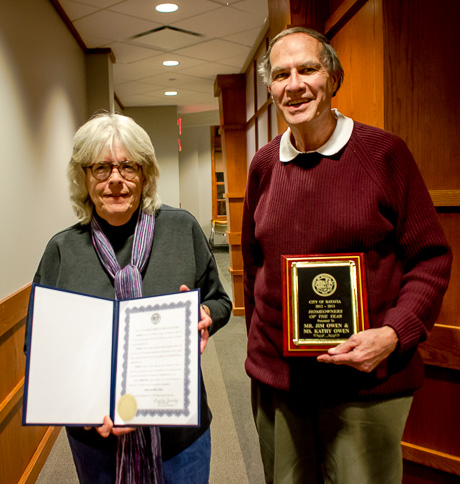The City Council found $54,000 to trim from the proposed 2014-15 city budget Monday night, reducing the proposed tax rate to $9.17.
There will be no free Wi-Fi Downtown and no electric car charging station.
There will be a new assistant city manager, and Jason Molino said that may be the most strategically critical component of the budget.
"For the first five or six years I was here, we focused on creating a good financial foundation and establishing good financial practices," Molino said. "That doesn't go by the wayside, but now we're broadening our horizon and saying what are the issues we want to focus on and that comes down to quality of life, economic development and community development. I think having another executive in the manager's office to help contribute to bring some of those goals to fruition will be a benefit."
The council rejected a proposal to remove the new position from the budget by a 4-5 vote.
Voting to remove the position were John Deleo, Brooks Hawley, Gene Jankowski and Kathy Briggs.
Voting to keep the position in the budget were Kris Doeringer, Patti Pacino, John Canale, Pierluigi Cipollone and Rose Mary Christian.
Deleo said he didn't think the position was necessary, that any additional duties falling into the city manager's lap could be outsourced or handled by part-timers. Hawley and Jankowski said they favored waiting at least a year to see if the position was really needed.
Jankowski also argued that the list of duties for the new manager will take somebody of super human knowledge and training.
The new duties of the new job will include:
-
Assist with the police facility needs assessment;
-
Prepare for negotiations with Genesee County regarding the water and sewer maintenance agreement and sales tax agreement;
-
Negotiate a new CSEA contract;
-
Work with Vibrant Batavia and Batavia PD on community and neighborhood engagement efforts;
-
Assist in infrastructure planning;
-
Support HR in reviewing and analyzing healthcare and workers compensation programs;
-
Act as the city's network administrator;
-
Monitor the city's insurance program and act as a risk manager;
-
Assist in preparing for the bond rating review; and,
-
Assist in coordinating the neighborhood engagement effort (the project formerly known as neighborhood sweeps), including overseeing the collection of data, interpretation of date from multiple city departments and outside agencies, establish priorities, milestones and performance metrics for determining the success of the program.
"When I read over the list, it paints a picture of so many talents and duties that will take so much time that the person won't have time to do much of anything," Jankowski said.
He then read through several of the times of the list and added, "I think this person is going to be so overworked with just the duties in the first year that next year he's going to need an assistant to help him."
The long list of duties that Jankowski read off, countered Cipollone, is exactly why the position is needed. The hard working city staff has been stretched thin by seven years of budget restraints, but for the city to move forward the staff -- and particularly Molino -- is going to need some help pursuing some of these initiatives.
"The city has come out of a dark place where we were in a hole and we were able to fight our way back," Cipollone said. "We want to make this place a city where people want to live and want to do business and to do that we need to focus on the things we want to get done to provide the quality of life we want here."
Jankowski argued that some of the duties slated for the new position are best handled by existing staff. The project formerly known as "neighborhood sweeps," Jankowski said, is the police chief's job, not some staffer in City Hall.
"As a former police officer I can say nothing aggravated me more than somebody coming in who doesn't know anything about police work and trying to tell me how to do my job," Jankowski said.
In an interview after the meeting, Molino used the neighborhood program as an example of an initiative that needs high-level supervision. It's not just a single-function job, but moves across departments and disciplines to coordinate the effort.
The project will require somebody who can crunch data, marshal resources, communicate with all department heads and help guide a team of city staff to effective decisions.
"That doesn't happen from just a police chief's perspective," Molino said. "It doesn't happen from a fire chief's perspective. It doesn't happen from a director of public works perspective. It happens with a team of people working together, critical thinkers who have the ability to understand these issues from a complex perspective and say 'how do we work together as a group, as a team?' "
From a community development stance, one of the most strategically important jobs of the new assistant city manager will be working on a FEMA program that should lower the cost of flood insurance for homeowners in designated floodplains.
That was the issue Christian zeroed in on and said that's why the residents of her district support creating the position.
"I really need somebody to come in and help with the flood insurance issue," Christian said. "Flood insurance is already so high and now they say it could go 25 percent higher. We have people who aren't able to sell their homes, they won't invest in their homes because the cost of flood insurance is so high. If they have to pay 25 percent more, who is going to buy a home there?"
Reversing the trend on the Southside of declining home values, Molino said, is critical to community development. It's not good for anybody in Batavia when homes go into disrepair and become hard to sell. That brings down everybody's property values.
"I think it has a real negative impact on real estate values on the Southside," Molino said. "I think any realtor would probably agree that it's a hindrance to selling a home in the floodplain because people see that they've got this other bill, really it's like another tax bill, and at times it's a larger-than-your-tax-bill payment on a home that's assessed at less than others averaged out through the rest of the city, and when you look at the census tracks, these are the lowest moderate income houses. That's a recipe I think we want to change."
The city's $16.6 million spending plan was originally proposed with a 3-cent property tax cut from the current $9.30. With the items removed from the budget proposal last night, another 10 cents will come off the tax rate.
A public hearing will be held on the budget proposal at 7 p.m., Feb. 24. The council will vote on the budget at its following business meeting.






